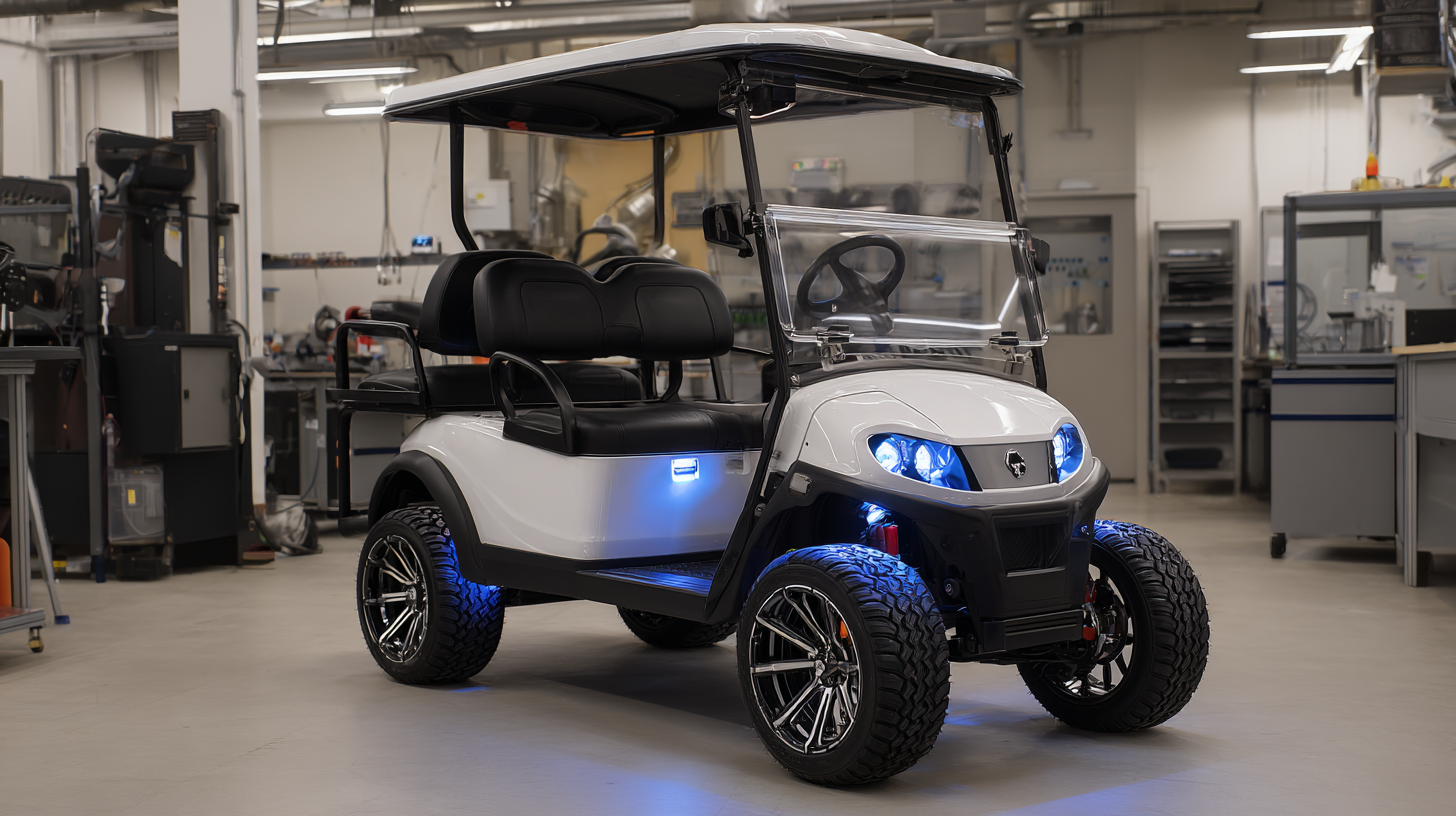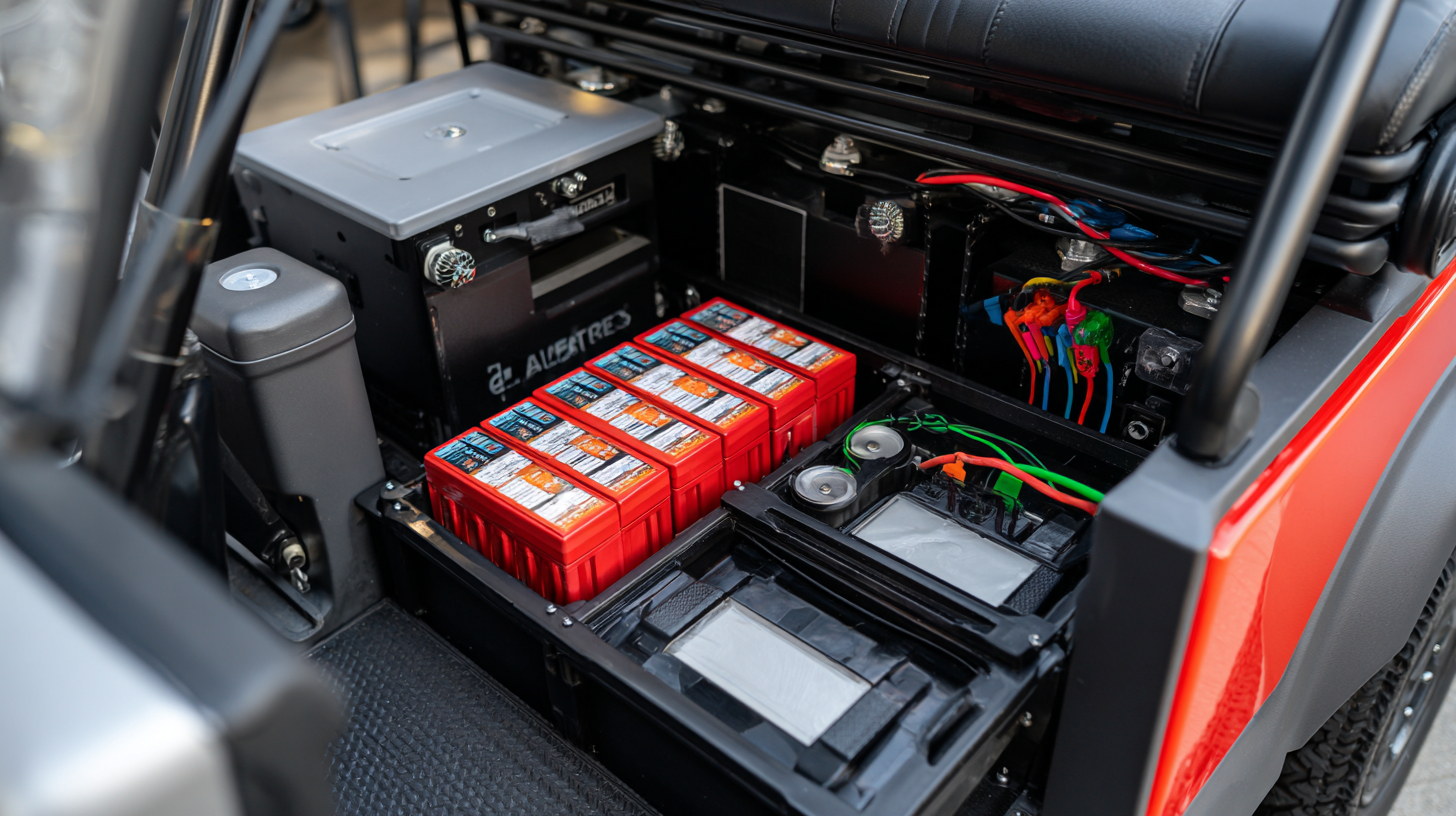Factory Tour
The Future of High Performance Golf Cart Batteries Powered by 48v Lifepo4 Technology
The future of high-performance golf cart batteries is increasingly being defined by advancements in 48v Lifepo4 technology. According to industry reports, the global demand for lithium iron phosphate (Lifepo4) batteries is projected to grow at a CAGR of over 20% from 2021 to 2026, driven by their superior safety, longevity, and energy density compared to traditional lead-acid batteries. The 48v Lifepo4 golf cart battery has emerged as a game-changer in the electric vehicle segment, offering users extended range and faster charging capabilities, making them ideal for golf courses and other recreational settings. As China continues to lead the way in smart manufacturing, these batteries are not only gaining popularity domestically but are also becoming a global standard, with promises of quality and reliability that meet evolving consumer expectations.

The Evolution of Golf Cart Battery Technologies: A 2025 Perspective
As we look towards 2025, the evolution of golf cart battery technologies is poised to undergo significant transformations, heavily influenced by advancements in lithium iron phosphate (LiFePO4) technology. Traditionally, golf carts have relied on lead-acid batteries, which although widely used, offer limited lifespan and efficiency. The shift towards 48V LiFePO4 batteries signals a major upgrade in performance, promising longer run times, reduced weight, and greater energy density. This progression not only enhances the user experience but also contributes to a more sustainable approach to energy consumption in the recreational vehicle sector.
Moreover, the incorporation of smart technology in LiFePO4 batteries is expected to revolutionize how users interact with their golf carts. With integrated monitoring systems that track battery health, charge cycles, and performance metrics, golfers will have access to real-time data that can inform their usage patterns. These advancements will allow for predictive maintenance, helping to extend battery life and ensuring optimal performance on the course. As golf cart manufacturers embrace these innovative battery technologies, players can expect not just a boost in performance but also a smoother, more environmentally-friendly golfing experience in the near future.
Understanding the Advantages of 48V LiFePO4 Batteries for Golf Carts
The transition to 48V LiFePO4 (Lithium Iron Phosphate) batteries is revolutionizing the landscape of high-performance golf carts. One of the primary advantages of these batteries is their enhanced energy density. Research from the National Renewable Energy Laboratory indicates that LiFePO4 batteries can deliver between 90-95% efficiency in energy use, compared to the 70-80% rates of traditional lead-acid batteries. This efficiency not only increases the range of golf carts but also minimizes the frequency of charging, making them ideal for extended use on the course.

Another significant benefit of 48V LiFePO4 batteries is their longevity. According to data from Battery University, these batteries can provide up to 2,000 charging cycles, or roughly 5-10 years of usage, depending on the application. In contrast, lead-acid batteries typically only last about 500 cycles. This translates to lower total cost of ownership for golf cart operators. Furthermore, LiFePO4 technology is known for its safety features, with a stable thermal profile that reduces the risk of fire—a crucial consideration in any battery application. These advantages not only enhance the performance of golf carts but also promote a more sustainable and cost-effective solution for golfers and operators alike.
Environmental Impact of Transitioning to LiFePO4 Technology in Golf Carts
The environmental impact of transitioning to LiFePO4 technology in golf carts is significant, marking a progressive step towards sustainability in the outdoor recreational industry. Lithium Iron Phosphate (LiFePO4) batteries offer a long lifespan and superior energy density compared to traditional lead-acid batteries. This results in fewer battery replacements over time, reducing waste. Moreover, LiFePO4 batteries are more efficient, converting a higher percentage of stored energy into usable power, which minimizes energy loss during operation.
Additionally, the production process of LiFePO4 batteries is more environmentally friendly. Unlike other lithium-ion technologies, LiFePO4 does not contain harmful heavy metals or toxic materials that can leach into the environment. By adopting this technology in golf carts, manufacturers can significantly lower their carbon footprint and contribute to cleaner air and water sources. As eco-conscious recreational activities gain popularity, the shift towards more sustainable power sources like LiFePO4 in golf carts helps align the industry with broader environmental goals, promoting a greener future for outdoor leisure.
Key Innovations in Golf Cart Battery Management Systems for 2025
As the golf cart industry evolves, the management systems for high-performance batteries are set to undergo significant advancements by 2025. The integration of 48V LiFePO4 technology is particularly noteworthy, promising enhanced efficiency and safety compared to traditional lead-acid batteries. Recent data from the International Battery Association indicates that lithium iron phosphate batteries not only have a longer lifespan—averaging 2,000 cycles versus 300 for lead-acid—but also exhibit superior thermal stability, reducing the risk of fire hazards, which has historically been a concern for battery-operated vehicles.

Key innovations in battery management systems (BMS) are expected to drive this transformation. By 2025, smart BMS will play a crucial role in optimizing charge cycles and ensuring the longevity of golf cart batteries. These systems leverage real-time data analytics, capable of monitoring battery health and performance parameters, leading to a more efficient charging process. Industry reports predict a 30% improvement in energy efficiency with the adoption of advanced BMS technologies, significantly decreasing operational costs for fleet operators. This shift not only enhances the user experience but also supports the growing demand for environmentally-friendly transportation solutions within the recreational sector.
Future Trends: How 48V Lithium Iron Phosphate Batteries Will Shape the Golf Industry
As the golf industry continues to evolve, the integration of 48V lithium iron phosphate (LiFePO4) battery technology is poised to revolutionize high-performance golf carts. With their exceptional energy density and thermal stability, these batteries offer a significant improvement over traditional lead-acid options. Golfers can expect longer playtime and reduced charging intervals, enhancing their overall experience on the course. The shift to 48V systems not only enhances performance but also encourages sustainability, as these batteries are far more environmentally friendly.
Future trends indicate a growing adoption of 48V LiFePO4 batteries across the golfing community, driven by demands for efficient power solutions. As golf courses aim to reduce their carbon footprint, battery technologies that offer longer life cycles and lower maintenance will become increasingly crucial. This innovation paves the way for lighter, faster, and more reliable golf carts, allowing manufacturers to design vehicles tailored to golfer needs. With improved technology, the golf industry stands at the brink of a new era, combining performance and sustainability for an unprecedented golfing experience.
The Future of High Performance Golf Cart Batteries Powered by 48v Lifepo4 Technology
| Feature | Description | Future Trend |
|---|---|---|
| Battery Type | Lithium Iron Phosphate (LiFePO4) | Increasing adoption due to safety and stability |
| Voltage | 48 Volts | Standardization across golf vehicles |
| Capacity | 150 Ah to 200 Ah | Higher capacity for extended range and performance |
| Charge Cycle Life | 2000 to 5000 cycles | Longer lifespan reduces overall replacement costs |
| Weight | 50-70 lbs per battery | Emphasis on lightweight solutions for better efficiency |
| Temperature Range | -4°F to 140°F (-20°C to 60°C) | Improved performance in extreme conditions |
| Environmental Impact | Minimal toxic chemicals, recyclable materials | Strong shift towards sustainable products |







